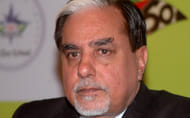New Delhi, May 10 (IANS) The new global cricket venture by Subhash Chandra's Essel Group has to be seen in the context of recent happenings in world cricket, particularly in India.
The uncertainty over the functioning of the Board of Control for Cricket in India (BCCI) and the resentment among some boards, particularly the Associates, over the way the International Cricket Council (ICC) is run may have prompted Essel to take on the establishment.
Whenever a global cricket venture is talked about, the first name associated with it is none other than Lalit Modi, who is credited with all the good and bad things of the Indian Premier League (IPL) he conceptualised and successfully launched eight years ago.
The Essel Group, which floated the short-lived Indian Cricket League (ICL) before the IPL put it out of business, is quick to deny Modi's involvement in its new global vision for cricket. Modi, on his part, also said he had nothing to do with it.
Votaries of the free market, Modi and his mentor Inderjit Singh Bindra always believed that cricket should be liberalised from the control of a handful of a cosy club of international boards/members. In fact, the BCCI had offered Subhash Chandra the telecast rights for offshore cricket during Sharad Pawar's regime, but this fell through for non-cricketing reasons.
Subhash Chandra, perhaps, perceives himself to be modern day Kerry Packer whose World Series Cricket (WSC) showed cricketers how to make big money without conforming themselves to traditional forms of the sport. He does not make bones about his intention that he is in the global sports business and feels cricket can be taken beyond the confines of the Commonwealth countries. Not a bad vision, but how will it work?
Calling it a part of its business promotion plans, Essel has registered companies in Australia, New Zealand and Scotland, the names sounding like parallel boards.
It is not clear as yet whether Essel is challenging the ICC or just looking at pure business prospects. Whatever be the case, the apex body of world cricket is forced to take note of the group's unusual "business interests".
The company hastened to say that the new business model has nothing to do with Ten Sports, thus safeguarding its existing interests. The TV network has broadcast rights for South Africa, the West Indies, Sri Lanka, Pakistan and Zimbabwe, saying the channel has nothing to do with the new venture.
The concept of taking cricket to far and wide is an old one. Even Jagmohan Dalmiya, when he was ICC chief and the then Indian board chief, used to talk about taking cricket to the Japanese and Chinese markets just as the European sports Czars today see India as a potential market.
Modi is clear that the proposed new league might gobble up the financially unsteady English counties. If Subhash Chandra succeeds in getting the English cricketers on his side he might as well go ahead with not only a parallel league but also a governing body to bargain with other established boards.
There is this talk of enticing top stars like Michael Clarke and David Warner by paying them $50 million in multi-year contracts. That's some money, but the point is whether the two have the power to wean away international cricketers, paying them close to what they themselves are promised. Then again, it will be like ICL getting Brian Lara when he was past his best cricketing years.
After the ICL fiasco, Subhash Chandra will not jump in without a proper blueprint and execution plan. He will also be wary of the Indian board's potential to sabotage his venture a second time.
The media mogul is frustrated by his unsuccessful bid for telecast rights to beam cricket in India for his Zee TV and its subsidiary Ten Sports and he sees there is no other go except to challenge cricket's established order. There can't be a better way to do it than planning a global Twenty20 tournament.
The group is aware of the pitfalls that pulled the 2007-09 ICL down and gave it a bad name in the market as well as among cricketers. Some 50 players are said to have been shortchanged and some of them went into litigation. To assure the players of safeguards this time the players may be given bank guarantees.
The other issue the organisers are taking care of is to have enough grounds to host matches, at least a dozen if their intention is to play home-away matches among some 10 city-based franchises. The grounds maintained by the state associations affiliated to the BCCI are out of bounds.
Interesting days are ahead, but it may not be easy to disturb the world of cricket as it is - more so when India is the real market.
Tailpiece: Subhash Chandra and ICC chairman Narayan Swamy Srinivasan are old pals and both know a thing or two about business and how to help each other in times of distress.
(Veturi Srivatsa is a senior journalist. He can be reached at v.srivatsa@ians.in)
Looking for fast live cricket scores? Download CricRocket and get fast score updates, top-notch commentary in-depth match stats & much more! 🚀☄️

